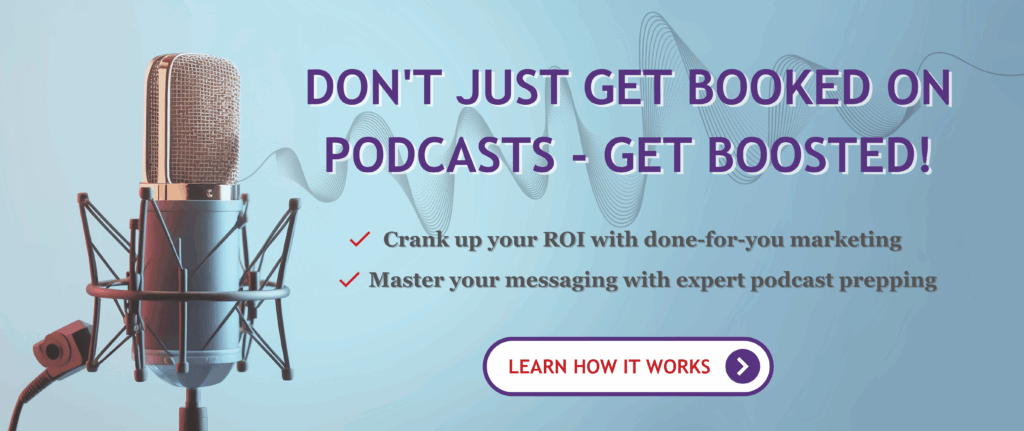
10 Reasons Guest Podcasting Gave You Zero Results (And What to Do About It)
Guest podcasting is becoming more and more popular among business leaders. It seems like an ideal opportunity, because you immediately get in front of other people’s audiences without the long and grueling work of building an audience yourself. But does guest podcasting actually generate any business benefit?
There’s a segment of business thought leaders who are disenchanted with guest podcasting. “It’s lots of light with no heat,” they say. They got in front of audiences, but they didn’t see a dime in sales that came from guest podcasting.
So what’s going on? Is guest podcasting for business worth the squeeze or not?
I think it is. But guest podcasting isn’t automatically going to show an ROI, just because you showed up to talk about your business on someone else’s show. You’ve got to be strategic and develop a plan that will turn potential business benefit into actual results.
Let’s take a look at the top 10 reasons why guest podcasting gives zero business results, and what you can do to flip the script.
Related: How to Reap the Business Benefits of Podcasting
1) You Didn’t Define a Goal
What were you expecting to accomplish from podcasting? Did you have it clearly defined — even written down — before venturing into guest podcasting? If the answer is something like, “We wanted to grow our business” or “We wanted more leads,” I’d say your goal wasn’t well defined.
Ideally, you should know exactly what you want to accomplish through podcast appearances — using SMART goal language. And you should know very concretely what you want to accomplish through each podcast you appear on.
For example, if you wanted to break into a new vertical, a SMART goal for guest podcasting might be:
Increase website traffic from FinTech audiences by 10% (to 1090 monthly visits from FinTech) by December 31, 2025.
Having specific outcomes in mind for each podcast gives you focus and hones your approach to podcasts. You will be more selective in the shows you get booked on, more purposeful about the topics you discuss, and more clear in your messaging while on the podcasts.
You’ll also be more likely to leave a strong impression on the audience, because you’re led by vision and purpose.
But if you don’t have a defined SMART goal driving your podcast appearances, you won’t have anything to aim for. How’s the saying go? “If you don’t know what you’re aiming for, you’ll hit it every time.” Something like that.
Anyway, you shouldn’t expect to hit a home run with podcasting if you swing at every pitch.
2) You Went on the Wrong Podcast
This is closely tied to the first reason. If you don’t know what your goals are, it’s really easy to end up on the wrong shows. And there are plenty of wrong shows to end up on.
Define your ideal podcast show:
- Who is your ideal audience, and what kinds of podcasts are they listening to?
- What podcasts speak to the industries you want to get in front of?
- How large must the podcast’s audience be?
- What kinds of topics should the podcast address?
- Is there a certain vibe or attitude, agenda, or political leaning that the podcast must or must not have?
You get the gist. There’s probably a few more questions you could add to the list. The point is, make sure you know what the ideal podcast looks like — what kind of podcast will help you reach your SMART goals — and pursue those shows.
3) You Were Hard to Listen To
You may be comfortable with speaking on a podcast, but that doesn’t mean it’s easy to listen to you.
Not everyone is a fascinating storyteller.
Not everyone is a polished speaker.
Not everyone is succinct.
Some of us mumble or speak in monotone or talk at 200 words per minute. Some of us just aren’t easy to listen to.
I myself tend to ramble, stammer, and use filler words when I speak. I have a hard time finding the right word, and I often hear myself repeating myself. And I have a podcast, too! (It’s called The Cyber Biz Speakeasy, you should check it out.)
It’s important to be interesting, because audiences won’t stick around if they don’t like listening to you. They’ll skip to the next episode or find another podcast that captures their attention.
If you’ve been on podcasts before, go back and listen to them with fresh, critical ears. Listen to yourself and ask whether or not you would listen to the whole episode if you weren’t you.
- Did you tell engaging and relevant stories?
- Was your voice dynamic, well paced, and interesting to listen to?
- Were you articulate and conversational, without being overly wordy?
- Did you omit filler words?
- If you were on video, how was your physical presence?
Don’t be hard to listen to. Think about what the audience wants — valuable information that’s entertaining. Be an interesting guest. Tell stories, and express energy and personality.
4) You Tried to Sell Your Product/Service
This is the quickest way to turn off your audience. Provide value, not pitches.
Podcasts are excellent for establishing thought leadership, but horrible for selling. Audiences tune in to get something of value, not to be sold a new product or service.
Ironically, you’re more likely to gain more customers in the long run by sharing thought leadership on podcasts than if you try to sell your solution.
Avoid These 7 Major B2B Marketing Mistakes
5) You Didn’t Give Away the Store
Ever watch Julia Child cook a duck? She would walk through every single step of the recipe on TV, giving the audience all of her secrets and pro tips, and leaving no detail out. By the end of the episode, everyone in her audience knew everything there was to know about cooking a duck.
Why didn’t she worry about her book sales suffering as a result?
The irony is that Julia Child was more likely to sell her books because she gave away her secrets! Why?
- She demonstrated the depth of her expertise
- Audiences felt more connected to her
- She earned viewers’ trust
In contrast, some podcast guests play their cards close to the vest. They don’t want to give out too much helpful information on the show, because they don’t want to give away the store. They think, “Why would anyone buy from us if we give them all the tools to solve their problems, themselves?”
The truth is, your audience is more likely to hire you after hearing all the details, because you’ve just proven your depth of knowledge and expertise, and you’ve shown that you care about helping people succeed.
Plus, the more detailed you get in describing your solution, the more your audience will realize it isn’t worth the trouble of doing it themselves — they’d rather just hire someone they can trust to do the job right.
And since you’ve just proven that you fit the bill, you’ve pretty much just put yourself at the top of their call list.
Worried about giving something away to the competition? Don’t. If they wanted to, your competitors could discover that information anyway.
6) You Didn’t Tell Listeners What to Do Next
People are like sheep. They’re waiting for you to tell them what to do next. In marketing, this is called a call to action (CTA). You could have the brightest minds listening to your podcast, but if you don’t tell them what the next step is, they won’t do it.
Instead, they’ll probably just listen to another podcast or check in on their favorite team. (FYI, the Tigers are leading 5-2 in the 5th. Go Tigs!)
What you want listeners to do is connect with your brand in some meaningful but appropriate way. That takes a call to action. At the very least, give them a CTA to visit your website.
You might also want them to contact your sales team, but that’s just not going to happen from a podcast. But maybe you can offer an ebook that’s related to your podcast topic, or a free self-assessment that you provide. Those could be great next steps for someone who wants to discover more without making a commitment.
Whatever you decide the next step is, be sure to mention it on the podcast before signing off. And provide a link for the show notes that goes to your website.
7) You Didn’t Promote the Podcast
Almost without exception, every guest that’s been on my podcast has promoted their episode on LinkedIn…once. To my knowledge, that’s the only promotion they’ve done for it.
That’s not unusual. I’m convinced that the vast majority of podcast guests share a link to the episode once (at most), then move on and never do anything about it after that.
Once your podcast episode is live, it’s out there forever. Why would you only tell the world about it once? As long as the content is still relevant and helpful, you should be promoting the heck out of your podcast appearances.
Of course, you don’t want to overdo it — but chances are pretty huge that you won’t do that. And considering the fact that most of your followers aren’t going to see every one of your social posts, not only is it okay to post more than once, it’s actually a really good idea.
So how often should you promote your podcast appearances? My recommendation is to share your latest podcast immediately after it goes live, then again a week or so later. After that, promote it once a month or so for as long as the episode has value.
If you’re a guest on a bunch of podcasts, at some point maybe it makes sense to reduce the frequency, just because of the number of podcast appearances you have to promote. But you can worry about that bridge when you jump from it. Or…you know.
8) You Aren’t Collecting Podcast Audience Data
I’ve heard business leaders complain that they tried podcasting and never saw any benefit from it. But most podcast guests aren’t tracking metrics from their podcast appearances. I know this, because it’s almost impossible to get good, useful audience metrics from podcasts. Especially if you’re the guest and not the host.
You could actually be getting good results from guest podcasting, but never know it because there weren’t any metrics to monitor.
Search engines like Google won’t tell you:
- How many people listened to your podcast episode
- How many visitors came from a specific podcast platform
- How many podcast listeners became leads
- How many podcast listeners eventually became customers
So if you don’t have any metrics to track, how can you tell if you’re seeing any benefit from guest podcasting?
Search engines can’t tell you how many visitors came from a podcast, but they can tell you what pages your visitors landed on. And that’s where you can gain some key insights.
You can discover how much of your traffic came from a podcast, and even what podcast, by creating a UTM code for your website. A UTM code is tacked onto the end of your web page’s URL, and it looks like this: yoursite.com/your-page/?utm_source=facebook&utm_medium=cpc&utm_campaign=springsale&utm_content=shoead
The UTM starts with the ? and includes everything that follows. Basically, it tags your URL with information that identifies the source, medium, and campaign details of website traffic.
You can create a UTM code for any page on your website. Provide the link to the podcast host for the show notes, and every visit to that special URL will be trackable in Google Analytics (and other website analytics tools).
So you can track website traffic from podcasts by monitoring URLs with UTM codes. Make UTMs specific to each podcast you’re on, and you’ll be able to see which podcasts provide the most traffic.
While this tactic won’t tell you how many people listen to your podcast episode, it does give you some visibility that you can use to measure success.
9) You Aren’t Capturing Listeners’ Email Addresses
Tracking traffic from podcasts is a great start, but don’t stop there — get the listeners’ email addresses too!
Create a lead magnet that’s specific to your podcast topic. Maybe it’s a checklist of the tips you talk about on the show. Maybe it’s a how-to guide that captures the key points you discuss. Whatever it is, the lead magnet should be helpful and provide real value. In other words, don’t be salesy.
While you’re on the show, mention the offer as a next step (see #7) at the end of your conversation, and give the host a link to the landing page (see #8). That landing page should have a download form that visitors fill out in order to receive the content.
See what you just did? You got in front of someone else’s audience, led them to your website, and turned those visitors into your leads.
Now you can start conversations with those new leads and begin nurturing them towards a sale.
On top of that, you’ve just opened up a bunch of new metrics that you can track to measure the effectiveness of guest podcasting — for example:
- Number of conversions
- New leads
- Sales leads from podcasting
- Demo requests from podcasting
- Closed deals from podcasting
…and so on.
Create Content That Keeps ‘Em Coming Back for More
10) You Shouldn’t Have Been on a Podcast in the First Place
Just because a podcast CAN be great for business, that doesn’t mean it will be great for YOUR business. Make sure it makes sense to do guest podcasting before you start getting booked on any shows.
Anything you do for marketing purposes should align with your business growth goals, and should consider your target audience. Ask these questions before seeking podcast appearances:
- How will a podcast help us to reach our business growth goals?
- Does our target audience listen to podcasts?
- Do we have any thought leadership to offer?
- Is a podcast the best platform to offer that thought leadership?
- Are we prepared to invest time and energy into guest podcasting — including the work it takes to make it successful?
Invest in the marketing strategies and tactics that will help you achieve your business goals. Everything else is a useless distraction.
Turn Up the Volume on Your Guest Podcasting
If you’re frustrated because podcast appearances haven’t yielded the results you were expecting, that doesn’t mean that podcasting doesn’t work or that it can’t work for you. While podcasting isn’t for every business, it can be beneficial for most B2B companies — if you’re strategic about it and if you’re willing to put in the work to make it fruitful.
Want to use podcasts to grow your business, but don’t have the resources it takes to make it effective? Don’t just get booked — get boosted! Good Gnus can help you find the right podcasts and achieve better ROI from each show you appear on. Let’s start a conversation!


